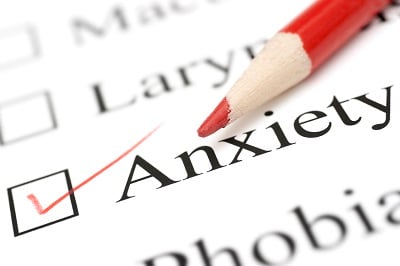Why Anxiety Should Not Be Feared
Why Anxiety Should Not Be Feared

It is time to stop dreading anxiety.
Few things motivate escape and avoidance more than the feeling of anxiety, the sense of apprehension and worry that a catastrophic outcome may lie ahead. Sometimes we can name it – tomorrow is the big test, the first online date, a telemedicine check-up by Zoom – other times, we are unsure of the source of our unease. Of course, few words promote anxiety more than coronavirus.
What we know is we want the feeling to go away, and we’ll do almost anything to get rid of the feeling – avoid studying for the test, cancel the date, skip the check-up. This desire to escape or avoid anxiety is very natural. After all, anxiety is meant to function as an alarm or warning signal to let us know that dangers lurk ahead so we can protect ourselves. It is a tremendously adaptive system and the associated bodily responses do a fantastic job at helping us manage objective dangers. So, if a bear is chasing us in the woods, then an acute fear response with a racing heart and shortness of breath that prepares the body to flee, fight, or freeze is just what we want to help escape the danger.
The problem is many people have come to fear the anxiety response itself; when we routinely have ‘false alarms’ going off, then situations that are not objectively dangerous --but make us feel anxious-- come to be feared and avoided. When we become intolerant of uncertainty and risk, and come to fear the experience of anxiety itself, our world becomes smaller. It is true we don’t know for sure how the test, the date, or the check-up will turn out, but rarely is our life better by avoiding or not preparing for these events.
As a clinical psychologist, I teach my clients that anxiety is uncomfortable but not dangerous. In fact, moderate levels of anxious arousal can improve our performance when we think about the arousal in a healthy way – it’s hard to give a good, lively speech when we feel absolutely no arousal, and some anxiety about the coronavirus can remind us to take needed precautions. Even high levels of anxiety are not themselves imminently harmful; a panic attack does not cause a heart attack. Rather, it is the sustained experience of anxiety and stress over time that can contribute to coronary heart disease and other negative health outcomes. And one of the significant risk factors for developing chronic anxiety is fearing the experience of anxiety, termed anxiety sensitivity, and repeatedly avoiding situations that trigger those feelings.
In contrast, when we come to see anxiety as signaling a challenge instead of a threat, our world gets bigger. We try new things, we surprise ourselves with what we can do, and we learn that failing is not actually the end of the world.
Of course, when an objective danger is present, it makes sense to escape that situation, but usually there is no bear chasing us in the woods -- we just feel that way. Certainly it makes sense to minimize risks in ways that don’t interfere with us living a full life – I always wear my seatbelt to reduce risks associated with driving. But what doesn’t make sense is to avoid driving altogether because I might have a car accident one day. There are so many places to see and go.
What does this mean for managing our anxiety about the coronavirus? It means we wear the equivalent of a ‘coronavirus seatbelt’ – we do the recommended hand washing, physical distancing, wearing masks in public, and other recommended healthy precautions from reliable sources like the Center for Disease Control. But we don’t stop living – we get creative about how to meet our goals as much as possible while still physical distancing (virtual dates are an option!) and we don’t make decisions based on panic (you probably don’t need 50 roles of toilet paper for just your household). Of course, this is a confusing time and it can be hard to know which advice to follow – the key is to ask yourself what factors you want to guide your decisions (e.g., What is the evidence to support the advice? Is it consistent with my values and the person I want to be? How will it affect others?). Anxiety is not a good decision-maker – it’s too inflexible.
Too many people are letting anxiety make decisions for them. Approximately 1 in 4 Americans will have an anxiety disorder in their lifetime, and still more experience clinically significant anxiety symptoms that lead them to turn down opportunities and undermine their own potential. Even for those who do not struggle with clinical levels of anxiety, the messages about fear and anxiety in our society are not healthy ones. Long before coronavirus, the repeated message has been that the world is a dangerous place and we are vulnerable. And more than that, we are fragile and can’t handle feelings of anxiety. The coronavirus risk of infection is objectively dangerous and we need to take the appropriate steps to mitigate that specific vulnerability, but that shouldn’t generalize to a belief that the world more generally is dangerous or that we are perpetually vulnerable and weak. Managing the insidious consequences of coronavirus, in terms of jobs and lives lost, is going to require all of our strength and resilience, as individuals and communities – this is not the time to overestimate threat and underestimate ourselves.
We need to change this narrative and embrace anxiety as the signal that a challenge lies ahead. We can shift the thinking pattern that screams in our heads that the situation portends a threat we cannot manage to a quieter voice that empowers us to handle a challenge, and recognize that we can get back up even when something doesn’t go well. It is time to develop a new mantra: Anxiety is uncomfortable but not dangerous. Anxiety can be tolerated so we don’t need to escape or avoid situations that make us anxious when no objective danger is present.
We can shift these patterns through cognitive behavior therapy or other evidence-based approaches to treat anxiety or, for those who want to try shifting their anxious thinking on their own, try one of the online approaches. For instance, our lab is testing free, new web-based programs to train less anxious thinking: https://mindtrails.virginia.edu/.
Ironically, when we stop dreading anxiety, it’s amazing how much calmer we feel!
To learn more about managing anxiety and other challenging emotions during COVID-19, please watch my ADAA webinar Managing the Roller Coaster of Emotions During COVID-19.












